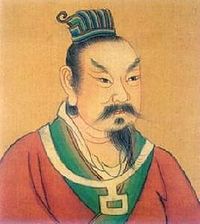| Emperor Taizu of Liang 梁太祖 | |||||||||||||||||
|---|---|---|---|---|---|---|---|---|---|---|---|---|---|---|---|---|---|
 | |||||||||||||||||
| Emperor of the Later Liang dynasty | |||||||||||||||||
| Reign | June 1, 907[1][2] – July 18, 912 | ||||||||||||||||
| Predecessor | Dynasty founder | ||||||||||||||||
| Successor | Zhu Yougui | ||||||||||||||||
| Born | December 5, 852[1][3] Dangshan, Songzhou, Tang China (modern Dangshan County, Suzhou, Anhui) | ||||||||||||||||
| Died | July 18, 912 (aged 59)[1][4] Kaifeng | ||||||||||||||||
| Burial | Xuan Mausoleum (宣陵; in modern Yichuan County, Henan) | ||||||||||||||||
| |||||||||||||||||
| House | Zhu | ||||||||||||||||
| Dynasty | Later Liang | ||||||||||||||||
| Occupation | Military general, monarch, politician | ||||||||||||||||
Emperor Taizu of Liang (梁太祖), personal name Zhu Quanzhong (朱全忠) (December 5, 852 – July 18, 912), né Zhu Wen (朱溫), name later changed to Zhu Huang (朱晃), nickname Zhu San (朱三, literally, "the third Zhu"), was a Chinese military general, monarch, and politician. He was a Jiedushi (military governor) and warlord who in 907 overthrew the Tang dynasty and established the Later Liang dynasty, ruling as its first emperor, ushering in the era of the Five Dynasties and Ten Kingdoms. The last two Tang emperors, Emperor Zhaozong of Tang (Li Jie) and Emperor Ai of Tang (Li Zuo), who "ruled" as his puppets from 903 to 907, were both murdered by him.
Zhu Wen initially served as a general under the rebel Huang Chao, but defected to the weakened Tang dynasty in 882. Taking advantage of the total chaos in the wake of Huang Chao's defeat, Zhu Wen was able to conquer parts of central China after destroying warlords such as Qin Zongquan, Shi Pu, Zhu Xuan, and Zhu Jin, although most of Shaanxi, Shanxi, and Hebei remained outside his reach, controlled by rival states Qi, Jin, and Yan respectively. Most of his later campaigns were directed at the Shatuo-ruled Jin state (later to become the Later Tang) based in Shanxi, but they failed because of the Jin leaders, Li Keyong and his son Li Cunxu. Due to his emphasis on unifying the north, Taizu was not able to make any inroads into southern China. Southern China came to be controlled by about seven different states, and the ruler Yang Wu and Former Shu was not submissive to him.
Zhu Wen used a combination of strict enforcement, ruthless violence and solicitation to ensure his officers stayed loyal to him. Zhu Wen was also a notorious sexual predator who raped not only the wives of his officers Yang Chongben and Zhang Quanyi, but also his own daughters-in-law. Zhu Wen's reign came to an end in 912 when he was murdered in his palace by his son Zhu Yougui, whom he had begotten with a prostitute Citation needed
- ^ a b c Academia Sinica Chinese-Western Calendar Converter.
- ^ Zizhi Tongjian, vol. 266.
- ^ History of the Five Dynasties, vol. 1.
- ^ History of the Five Dynasties, vol. 7.